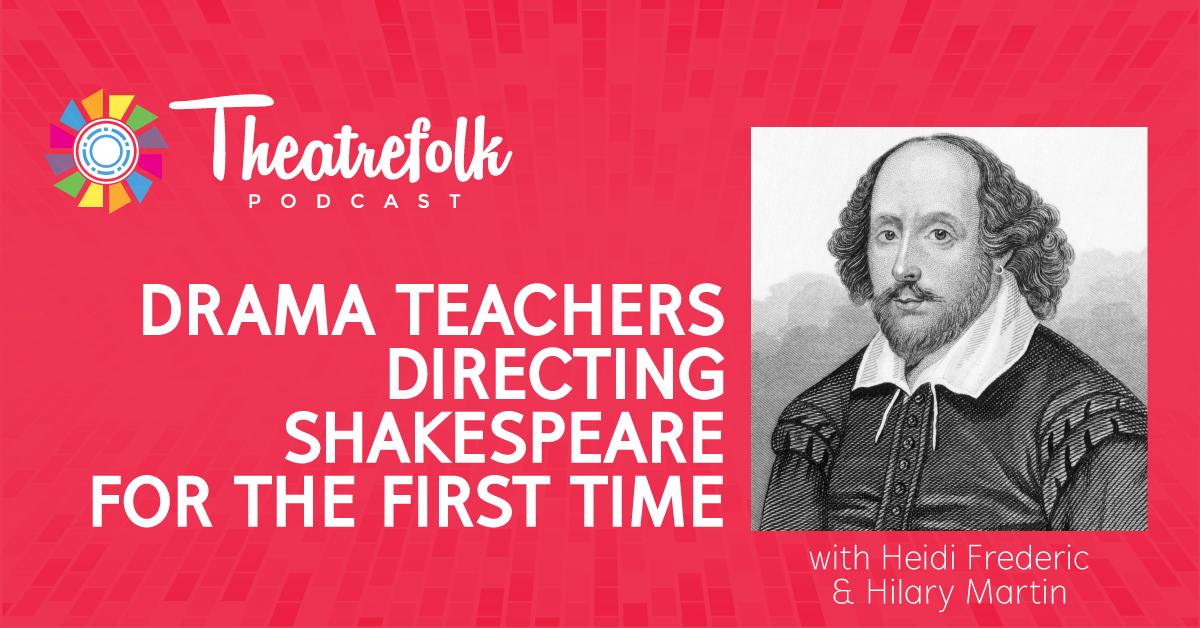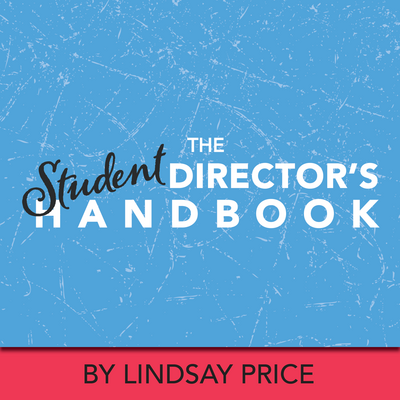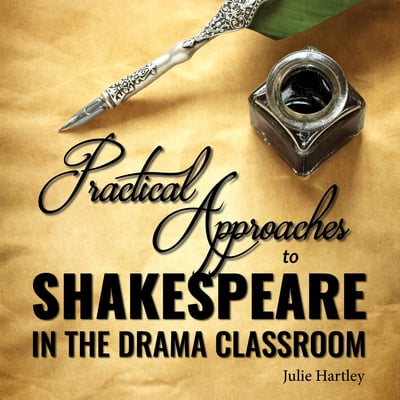Drama Teachers Directing Shakespeare for the First Time
If you’re a drama teacher, Shakespeare should make it onto your stage at some point. But what if you’ve hated him since high school yourself? Shakespeare is a great challenge—one that is easier to embrace than skydiving.
On the Drama Teacher Podcast, we heard from two teachers–Heidi Frederic (Romeo & Juliet) and Hilary Martin (Much Ado About Nothing)–about their experiences directing Shakespeare for the first time. They have some great tips to share!
1. Ask for help
Heidi says: ‘I was calling all the troops to help me out. “I cannot do this alone!”’
In this day and age, you don’t have to go it alone. Where it’s a workshop in your area, an experienced teacher at a neighbouring school, or even just online—there are many place to access help. Here are a few resources to get you started:
- No Fear Shakespeare
- Drama Resource
- Look for online exercises (like this one on Iambic Pentameter)
- The Drama Teacher Academy
- eDTA Open Forum through Educational Theatre Association
Hilary notes: ‘Your English teacher is your friend…don’t be afraid to collaborate with the English teacher.’ Call on those who’ve taught Shakespeare in a different context, especially when the students are decoding the script.
2. Consider a variety of script options
There are so many ways to skin the Shakespeare “cat” and make it manageable, especially the first time. Consider:
- Adaptations
- Abridged versions
- One acts vs. full lengths
Here are some Theatrefolk resources and plays to get you started:
- Romeo and Juliet 1-hour cut with annotations
- Much Ado About Nothing 1-hour cut with annotations
- Shakespeare adaptations and parodies including Drop Dead, Juliet! & Much Ado High School
- Shakespeare in an Hour
- Solo-Speare a collection of Shakespeare Monologues
- Scene-Speare a collection of Shakespeare Scenes
3. Find something to connect to and pull it into your comfort zone
When you’re doing something far out of your comfort zone, there are ways to find a little comfort. Find something that you connect to and that you relate to, to make your experience smoother.
For example, Heidi adapted Romeo and Juliet and set it in 1994 Seattle with a grunge theme. She says: ‘It helped the students understand the story and the language a lot better.’
Hilary’s students identified Much Ado as a soap opera, which helped them latch on to how they could act extremes in the play. She notes: ‘The over the top acting will also help the audience, who may not have had a lot of exposure to Shakespeare.’
- Read this blog post about setting Shakespeare in another time.
- Read this one about putting Shakespeare in context.
4. Consider the unique rehearsal process with Shakespeare
Consider pre-rehearsal activities to get students more familiar with the material. In Hilary’s case, her group watched film versions of Much Ado About Nothing, browsed lesson plans, and looked at small parts of the language.
Expect that you (as a director) and the actors will have to look at the language and analyze the script a lot more closely.
Heidi found No Fear Shakespeare books to be helpful, as well as taking the time for a close reading of the material. It’s critical to take an intensive look at the phrasing and wording, so that students aren’t just up there saying the words. They need to know the story and what’s going on.
Hilary relates: ‘The key is going slow.’ She and her students spent a lot of time just reading through the scenes and stopping to analyze whenever the language got confusing.
Embrace the challenge! Ask yourself: “Why not Shakespeare?” For more inspiration, check out these Drama Teacher Podcasts:
Related Articles
The Student Director's Handbook
by Lindsay Price
Help students take their show from first audition to opening night with The Student Director’s Handbook. This easy-to-use ebook is full of guidelines, tips and templates designed to help students create a vision, circumvent problems and organize rehearsals on their way to a successful production.
The Rehearsal Companion
by Kerry Hishon
You’ve chosen the play, paid the royalties, done the script analysis, held your auditions, and cast the show. Tomorrow is the first rehearsal. Are you ready? Really ready? The Rehearsal Companion can help!
Practical Approaches to Shakespeare in the Drama Classroom
by Julie Hartley
Shakespeare is one of the greatest resources a drama teacher can have. But teaching it can be a challenge. Practical Approaches to Shakespeare in the Drama Classroom helps drama teachers break down the Bard to make his themes, language and characters accessible to all.
Script Bundle - Shakespeare plays
A selection of 10 Shakespeare perusal scripts. Whether it's a cutting that uses the original text, a monologue or scene book, or a parody that spoofs the story, these plays offer a great window into Shakespeare's world.







